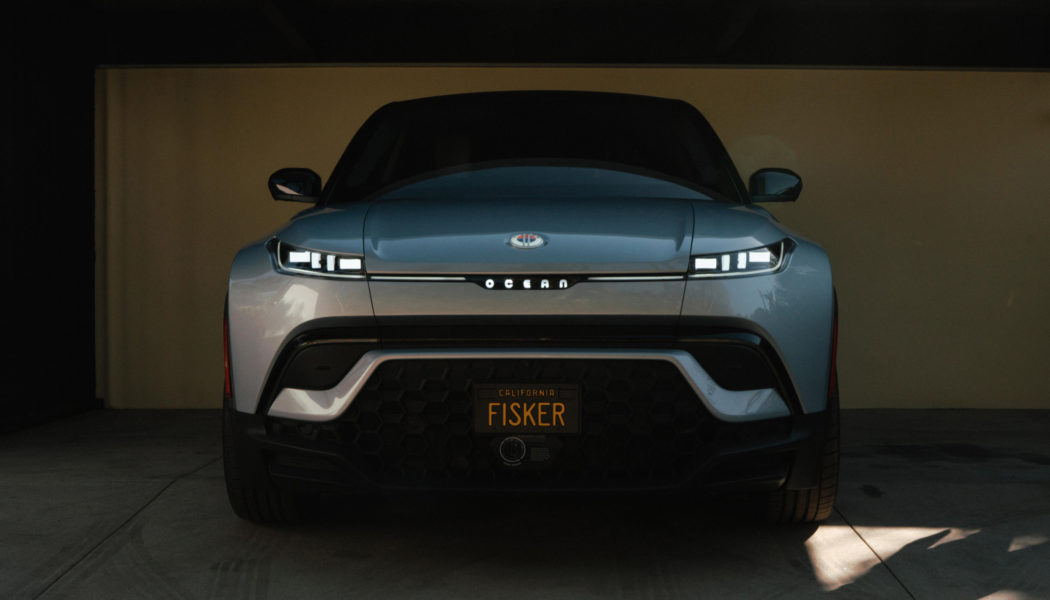EV startup Fisker Inc. has revealed the production version of its first electric vehicle, the Ocean SUV, at the 2021 LA Auto Show. It’s largely similar to the first prototype that debuted at the 2020 Consumer Electronics Show, though there are a few new standout features — including a 17.1-inch touchscreen that rotates from portrait to landscape orientation.
“When you use your phone and type on it, you hold it like this, and when you take a picture or if you want to watch a movie, you turn the phone around,” Fisker Inc. founder and CEO Henrik Fisker said while miming a phone during a livestream of Wednesday’s event. “In our vehicle we have a screen, on a push of a button, it changes from portrait mode to landscape mode. It just rotates. That is a really cool feature.”
Fisker didn’t elaborate any further on why a rotating touchscreen the size of a small TV may be useful. But buyers who want it will have to pony up $68,999, because it’s only available on the top trim — the aggressively named Fisker Ocean Extreme — or the limited-edition launch version of the SUV (which is more or less the same as the top trim). The screen defaults to portrait orientation; the 17.1-inch screen in the lower trims doesn’t rotate.
Also locked to the top trim of the Ocean is the solar roof — a feature that was touted in the original prototype. Fisker Inc. says the panels will be able to capture enough energy from the sun to power up to 1,500 miles of driving per year. (Fine print on the company’s website says this assumes that the system is operating at 5.4kWh per square meter.) Ocean Extreme buyers get a better sound system, front and rear heated seats, and a few other exclusive features.
The middle trim, the Ocean Ultra, will cost $49,999, while the base Ocean Sport runs $37,499. Fisker says it will offer an all-inclusive flexible lease option for the Ocean Sport that costs $379 per month (with a $2,999 “initiation and activation fee”) and has a 30,000-mile annual driving limit. All three trims will come with the advanced driver assistance system Fisker Inc. is developing.
Performance-wise, Fisker Inc. claims the Ocean Sport will get around 250 miles of range. The company is working with Chinese battery supplier CATL to put lithium iron phosphate batteries in the Sport — similar to what Tesla is starting to do with its shorter-range cars. The Ocean Sport takes the power from that battery pack and sends it to just a single motor at the front of the car with 275 horsepower at its peak. Still, Fisker Inc. claims it will go from 0 to 60 miles per hour in 6.9 seconds.
The Ocean Ultra and Ocean Extreme both use a pack built with lithium-manganese-cobalt-oxide batteries that can stretch the range to 340 miles and 350 miles, respectively, Fisker Inc. claims. That’s despite those two trims being outfitted with an all-wheel drive setup that uses two electric motors. The dual-motor setup on the Ocean Ultra will generate up to 540 horsepower and can hit 60 miles per hour in 3.9 seconds, while the Ocean Extreme’s touches 550HP and clears 60 miles per hour in 3.6 seconds. Both versions offer torque vectoring, too.
“This is the most advanced powertrain I think in the world right now,” Fisker said onstage Wednesday. “I’ve actually driven this on a track — an early prototype — and you can drive about 10 miles [per hour] faster than you even think is possible … you will actually experience that you feel like a Formula One driver when you drive this vehicle.”
Fisker Inc. says all three versions of the Ocean will be able to charge other electric cars or an owner’s home, part of the startup’s larger mission of promoting clean energy. That larger mission includes using recycled materials in the Ocean’s interior, relying on hydro power at the plant where the SUV will be built and the solar panels on the top trim.
The final version of the Ocean revealed Wednesday is what will get built late next year by Austrian automotive supplier Magna, as Fisker Inc. is taking an extraordinarily asset-light approach to being an automaker. Instead of owning and operating its own factory, Fisker Inc. will lean on Magna and, for other future models, Foxconn.
That asset-light approach arguably helped Fisker Inc. survive long enough to bask in the SPAC-merger boom, which helped it raise more than $1 billion. The startup was close to running out of cash in early 2020 according to a lawsuit from its former marketing VP, and it had wound up in that position after pivoting away from solid state batteries and a fancy, expensive sports car.









